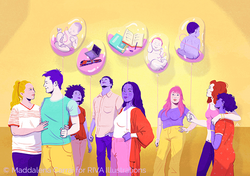Delayed Reproduction: Challenges and Prospects
Wittgenstein Centre Conference 2024
21 - 22 November 2024, Vienna, Austria
Family formation is occurring at ever later ages around the world. Delayed reproduction brings new challenges for individuals and couples. They are confronted with higher risks of infertility and other constraints as they navigate their parenthood plans. The trend to later reproduction is likely to continue and to have far-reaching societal consequences in the future, potentially contributing to lower fertility rates and higher prevalence of infertility in societies already experiencing low fertility.
This conference will focus on shifting trends, drivers and consequences of delayed reproduction, paying special attention to biological constraints as well as to the impact of assisted reproduction technologies and their potential role in shaping future fertility trends. We especially invite contributions on the following themes:
- Adapting to new parenthood timing: Fertility plans in contexts of delayed fertility, intentions and their (non)realisation at higher reproductive ages
- Changing reproductive trajectories: Individual factors of childbearing associated with later birth schedules, shifting family paths
- Social inequalities: Socio-economic disparities in late fertility, access to assisted reproduction
- Societal consequences: Impact on childlessness and family size, changing norms related to reproduction and parenthood at later ages
- Broken age limits to fertility? Biological limits and constraints to late reproduction, infertility
- Reproductive techno-futures: Contribution of assisted reproductive technologies to late fertility, their potential and limits for the future
- Policy responses: which policies can prevent or adapt to shifts to later reproduction
We are pleased to announce our keynote speakers:
Jacky Boivin (Cardiff University)
Anna Rotkirch (Population Research Institute)
Lucy van de Wiel (King’s College)
Paper submission closed by 15 May 2024.
Notifications of acceptance will be sent out in early July 2024.
All presentations are expected to be held in person.
Agenda will be published in September.
Side event for GGS users
Before the conference, the pre-gathering Fertility and family trends: Insights from GGS Austria and beyond will take place on 20 November 2024. This event aims to facilitate connections among professionals and students engaged in family and fertility research who utilize data from the Generations and Gender Survey (GGS).
Conference applicants using GGS data in their submitted research can indicate in the submission form whether they wish to have their application considered for an oral presentation at the side event.
The side event is organised within the framework of GGP.
Contact: ggp-workshop2024(at)oeaw.ac.at
Conference Organisers
Éva Beaujouan (University of Vienna)
Marie-Caroline Compans (University of Vienna)
Tomáš Sobotka (VID/Austrian Academy of Sciences)
Cristina Suero (University of Vienna)
Dilek Yildiz (IIASA)
Contact
For any questions regarding the conference, please contact conference.vid(at)oeaw.ac.at
Vienna Yearbook
A special issue of the Vienna Yearbook of Population Research will be dedicated to the topic of this conference. Conference participants and other researchers will be invited to submit their papers on the conference theme to this platinum open-access journal.
Acknowledgement
This conference is co-financed by ERC grant research project BIC.LATE
BIC.LATE receives funding from the European Research Council (ERC) under the European Union’s Horizon 2020 research and innovation programme (grant Agreement No 101001410).
This conference is co-financed by ERC grant research project BIC.LATE
BIC.LATE receives funding from the European Research Council (ERC) under the European Union’s Horizon 2020 research and innovation programme (grant Agreement No 101001410).
Side event for GGS Users:
Fertility and family trends: Insights from GGP-Austria and beyond






